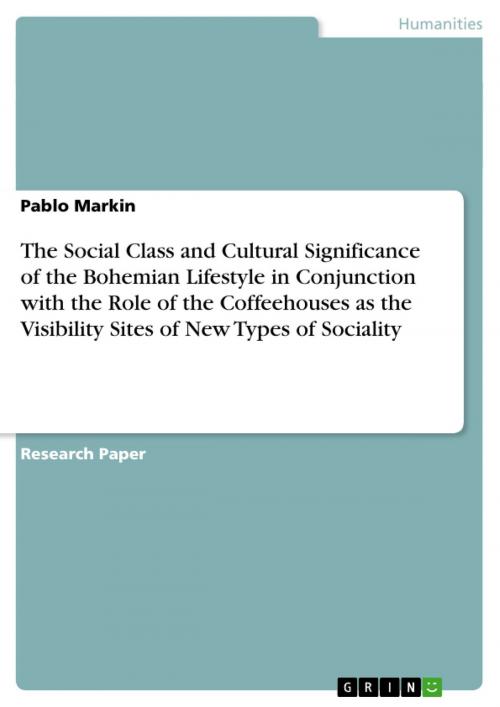The Social Class and Cultural Significance of the Bohemian Lifestyle in Conjunction with the Role of the Coffeehouses as the Visibility Sites of New Types of Sociality
Nonfiction, Social & Cultural Studies, Social Science, Sociology| Author: | Pablo Markin | ISBN: | 9783640252268 |
| Publisher: | GRIN Verlag | Publication: | January 23, 2009 |
| Imprint: | GRIN Verlag | Language: | English |
| Author: | Pablo Markin |
| ISBN: | 9783640252268 |
| Publisher: | GRIN Verlag |
| Publication: | January 23, 2009 |
| Imprint: | GRIN Verlag |
| Language: | English |
Research Paper (postgraduate) from the year 2001 in the subject Sociology - Miscellaneous, grade: 90, erg International School - Hebrew University of Jerusalem, Israel (Helmut Kohl Institute for European Studies), course: The Popular Culture in the Nineteenth Century Europe, 27 entries in the bibliography, language: English, abstract: The bohemians to a great measure directed not only their daily behaviour and appearances but also consciously created the image of themselves that was to be handed down to the generations to come. As a social class and as a space of positions within the general social structure their very emergence have become possible through the creation of the market for cultural goods from one side, and through the general rise in the level of the European economic activity that gradually has had its influence on the general standard of living. According to a series of researchers the coffee-houses are heterogeneous sites because of the various uses of this type of social space, on one side of spectrum of such activities are gambling and prostitution, while on the other newspapers reading and political pamphlets, as well as because of structural functionality of their position within the realization of the dynamics of modernity as an epoch spanning the period from the late Renaissance to the twentieth century (Hetherington 1997: 14; Ellis 1956; Billington 1980; Stallybrass and White 1986). The essence of the umbilical relationship of the bourgeoisie as a social class and of the identitarian politics of its self-constitution against the site of the social space that presents itself both as other and as the identical to the ethos of the middle class is revealed in the role the coffee-house played in the seventeenth and eighteenth century with regard to the stabilization of the ways the bourgeois social relations work.
Research Paper (postgraduate) from the year 2001 in the subject Sociology - Miscellaneous, grade: 90, erg International School - Hebrew University of Jerusalem, Israel (Helmut Kohl Institute for European Studies), course: The Popular Culture in the Nineteenth Century Europe, 27 entries in the bibliography, language: English, abstract: The bohemians to a great measure directed not only their daily behaviour and appearances but also consciously created the image of themselves that was to be handed down to the generations to come. As a social class and as a space of positions within the general social structure their very emergence have become possible through the creation of the market for cultural goods from one side, and through the general rise in the level of the European economic activity that gradually has had its influence on the general standard of living. According to a series of researchers the coffee-houses are heterogeneous sites because of the various uses of this type of social space, on one side of spectrum of such activities are gambling and prostitution, while on the other newspapers reading and political pamphlets, as well as because of structural functionality of their position within the realization of the dynamics of modernity as an epoch spanning the period from the late Renaissance to the twentieth century (Hetherington 1997: 14; Ellis 1956; Billington 1980; Stallybrass and White 1986). The essence of the umbilical relationship of the bourgeoisie as a social class and of the identitarian politics of its self-constitution against the site of the social space that presents itself both as other and as the identical to the ethos of the middle class is revealed in the role the coffee-house played in the seventeenth and eighteenth century with regard to the stabilization of the ways the bourgeois social relations work.















